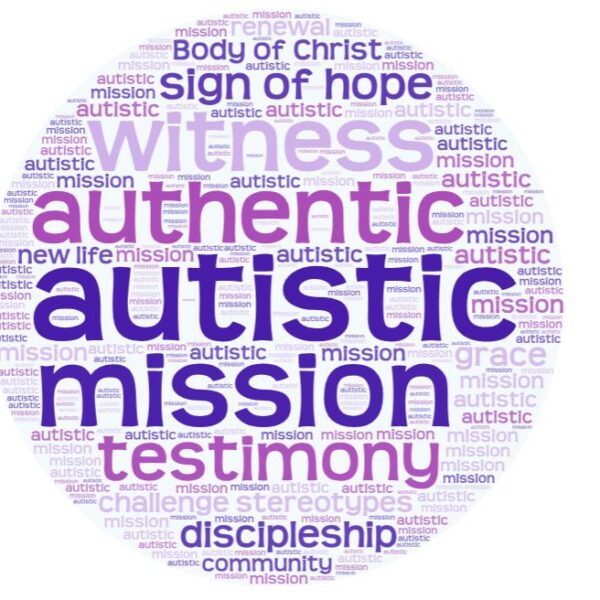by Aimée O’Connell
Nearly three weeks into the Lenten season, I come to our readers with the following string of thoughts, under the category heading: NOTHING WE HAVE EVER HEARD ABOUT LENT WAS IMAGINED WITH NEURODIVERSE INDIVIDUALS IN MIND.
(Okay… since I am a stickler for avoiding absolutes, let’s say “Almost Nothing.”)
While the better time to post this might have been before Lent began, there’s something to be said about solidarity in the trenches. By “trenches,” I mean the places where we find the people who…
- Are still trying to think of what to do for Lent
- Have tried adding things but have not yet made it happen consistently
- Have tried giving things up but realize we don’t function well without them
- Have sat staring at examinations of conscience and wondered when we will ever find one that applies to our lives
- Have abandoned stacks of planners, devotionals, penitential calendars and mini-retreats which seemed like a great idea when we picked them up
- Find Lent JUST TOO MUCH
Maybe this doesn’t apply to you (… congrats!). Or, maybe you’re reading this and thinking this is not exclusively an autism or ADHD thing (… but I will say, even if that’s the case, I guarantee, we feel it much more intensely!) Bottom line is, I don’t see much written about the particular challenges of Lent for the neurodiverse, and so, for those who find Lent penitential for the sake of its being unattainable: you are not alone!
My intention here is not to say that Lent should be jettisoned altogether, or that neurodiverse people should be dispensed from Lent. What I do wish is that we could have some real resources available for the neurodiverse, a list of Lent Hacks for us to familiarize ourselves with and practice here and there so that when the actual season rolls around, we have something proven to work with. I don’t claim to have the answers, but I do have a growing list of thoughts.
For starters: We need to define Lent consistently and concisely. What IS Lent? We know it is a time of prayer, fasting and almsgiving, intended to remind us that our purpose in life is to love God with all our hearts, minds, souls and strength, and to pattern our lives around loving God, particularly in how we treat others. Some will say it is a time to steer our focus back to God and away from the distractions of worldly entertainments and luxuries. Some will say it is a time to make room for God amidst the clutter of our lives. Some will say it is a time to discard the things that tempt us away from God, or a time to develop habits of prayer, meditation and contemplation. All of this sounds good, in a very general sense; but, for the neurodiverse, it can also sound too broad… not specific enough… not tangible, not measurable – and, therefore, not anything we can grasp, physically or conceptually.
What about when the things other people consider “luxuries” are, for us, necessities? Who decides what constitutes luxury? If we go by what the devotional guides say, we end up going without things that we absolutely rely on, such as grocery delivery and prepared meals. Even more difficult is teasing out what others consider “entertainments” which, again, for us, are necessities. Many, many neurodiverse people can regulate, cope and function better with help from electronic devices with screens. Many of us communicate and connect with others over electronic devices in ways we simply cannot do in person. Who gets to decide what is adaptive and assistive, and what is “luxury” or “entertainment”? I never see that distinction made in suggested acts of penance or fasting… just the same urging to switch off our screens so that we can be more present to the people around us. (If that were possible, we’d have already done it). Where is the line drawn between acts of penance and denying ourselves basic needs? And why is it okay to lump the things that neurodiverse people successfully rely on to function, in with the things deemed superfluous by neurotypical people, without some kind of qualification? Does anyone ever suggest giving up other assistive and adaptive accommodations that are acceptable standards for other disabilities? Is it ever printed in a Lenten devotional, “Just for today, leave your walker or cane home” – or, “For these forty days, stop relying on closed captioning, and rely on God instead” – ?
What about when our executive functioning does not know the difference between “distractions” and “important items”? Do the authors of Lenten devotionals realize that, for some people, what you call “distractions” are an integral part of our panoramic, multisensory processing, and can’t just be given up? Moreover, if what others call distractions are a way of life for us, is any spiritual growth even possible? All I’ve seen are essays and dissertations saying that distractions are our downfall. There goes another category of things that sound good for typical people, but don’t apply to us, unless difficulties with executive functioning really do disqualify us as saints.
Another question: How can we know which way to pray best, when the suggestion is to “pray more”? What if we have difficulty keeping all our tasks in mind for any given day, and are doing well, but do not have the cognitive flexibility to stop midstream and pray? What if our functioning is stretched to its limit already? What can we give up, to make time for prayer, when we struggle with time-blindness? What if praying feels too verbal for us on any given day? We are taught that mental prayer takes focus and years of discipline, and requires things like stillness and interior silence which does not often come easily to the neurodivergent. We may be outwardly silent, but inwardly, the trains of thought are running on multiple tracks at full capacity. We don’t have the cognitive ability to just stop. Where is that accounted for, in Lenten guides and spiritual direction?
As an autistic adult, I find the Lenten guides for children easier to use and follow than those intended for grown-ups. It is easier for me to concretely count out some of my possessions with the idea of donating them, or to budget out a certain percentage of my income or savings for charity. It is easier to count prayers or minutes or check-boxes than to try and do an assessment of my life and my habits – because my environment and my routines are all wrapped up in the wild and crazy way I make sense of the world and function in it. And yet – when I pray by rote, and write checks because it’s the time of year to do so… it doesn’t feel any different afterward. I’ve done my duty. How does that bring me closer to God?
Making a list of Lenten Resolutions has likewise proven ineffective for many of us, mainly because it is the equivalent of taking our familiar flight plan and adding in several detours and extra stops – without the allowance of more time in the itinerary. Calling our routines “autopilot” is not a bad thing at all. Autopilot is a reliable means of getting from Point A to Point B in the face of all kinds of variables, interference and conditions. Taking a plane off autopilot is not a guaranteed disaster, but it requires an enormous and constant expenditure of attention, energy and action. While we can fairly say it will develop discipline among the flight crew, it will also put everyone on high alert and raise the potential for going off course and encountering difficulties, and demands our full, constant and immediate attention. We all know that voluntarily adding stress to our already-stretched-too-thin processing systems is a straight line to crash and burn. Changing our routines for Lent – at least, among the neurodiverse – is not a very useful idea; and yet, that seems to be the overarching theme to most Lent devotionals and calendars.
More and more, I see the need – a desperate need – for new wineskins for neurodiverse people. We need guidance on how to approach Lent in the ways we are wired to approach anything. We need permission to pass up the devotionals, calendars and suggested penances which are written for neurotypical lifestyles. We need better examinations of conscience, written by neurodiverse individuals for neurodiverse individuals, so that we do not keep treating our failure to align with neurotypical standards as sinful. Of course we sin, of course we are in need of forgiveness – but how many sinful habits have evolved from trying to do things in ways not suited to our wiring? How much confusion comes from compromising our needs because we have been conditioned from the youngest age that it is of utmost importance to satisfy others? How many times has our character been called into question over things we genuinely cannot change about ourselves?
We need to hear more from neurodiverse clergy, supported by more and better understanding of neurodiversity by the Church. This is something I pray for every day. I would like to see a prayer calendar with forty days’ reflections on how our Church can grow in this understanding and need for support. I would imagine this would benefit the entire Body of Christ, not just the neurodiverse.
For now, my working plan is to see Lent as a season during which we invite Our Lord to show Himself to us in our lives, and to show us the ways our lives can be offered (i.e., made meaningful) to Him. How does He use our neurodiversity to build the Kingdom of God? How does the witness of our lives reflect Him to those in our orbit? Do we spend more of our energy trying to know, love and serve Him in neurotypical ways than in ways that we are naturally wired to be? Do we trust that He does not ask us to extend ourselves past our neurodivergent limits? Do we trust that it is better to say “no” to resolutions that are not compatible with (and even harmful to) our physical, sensory or social processing?
It takes real courage to step out of the boxes other people would have us in, and be authentically and vulnerably who we are. To me, that is the most radical offering we can make.




